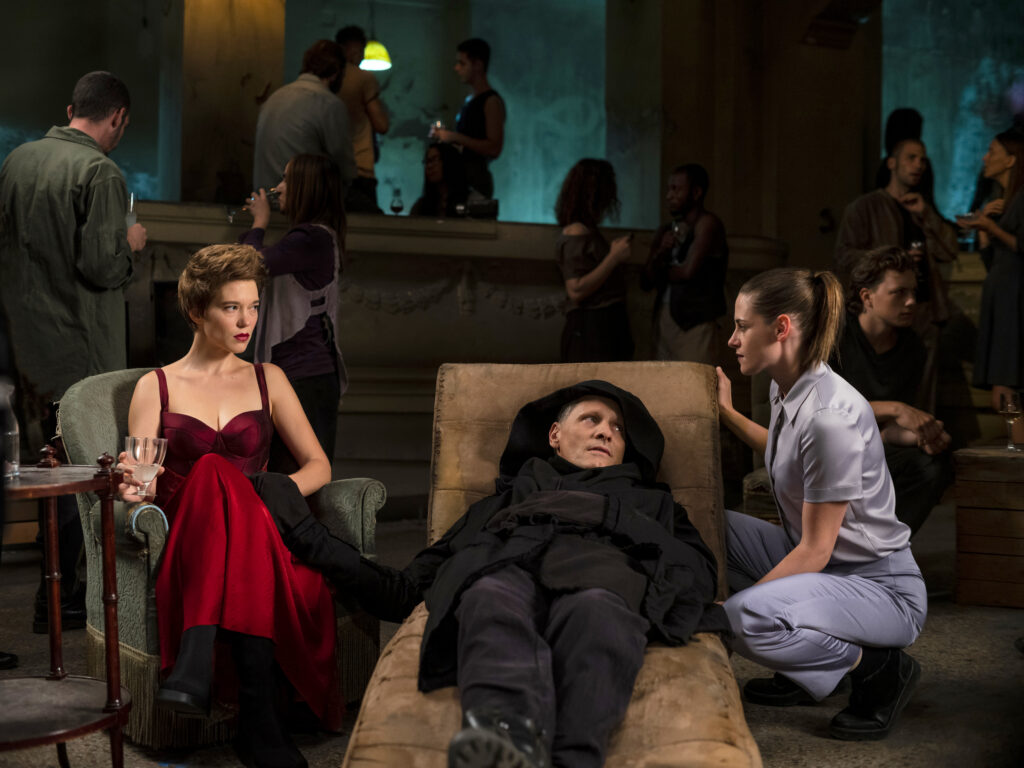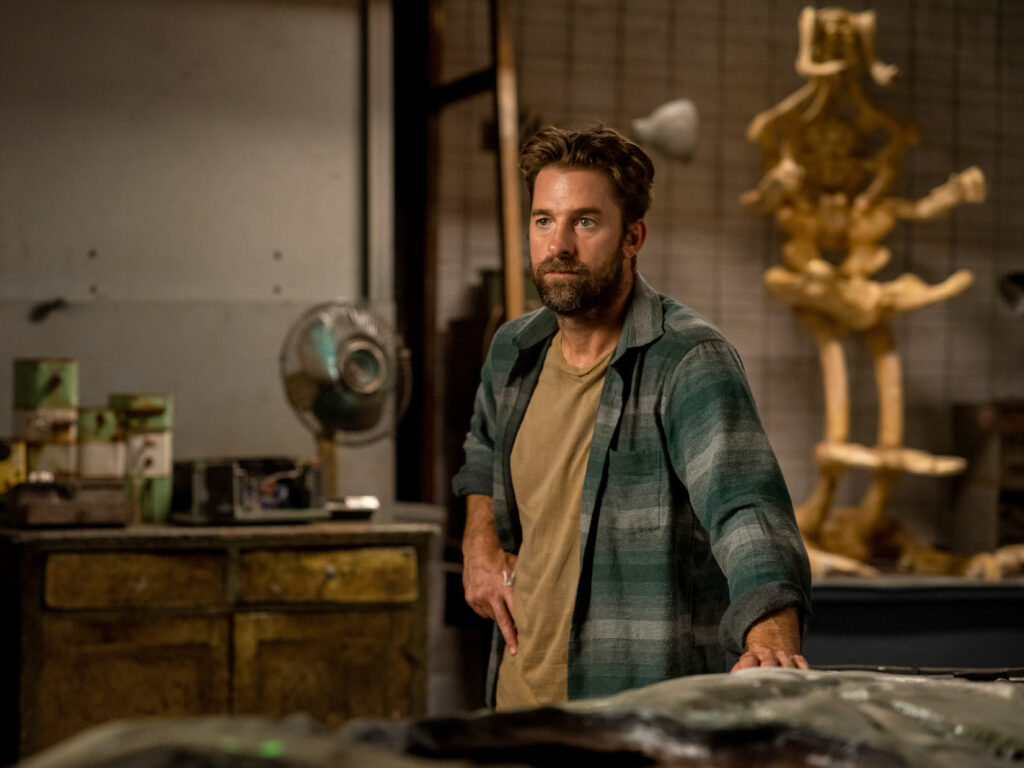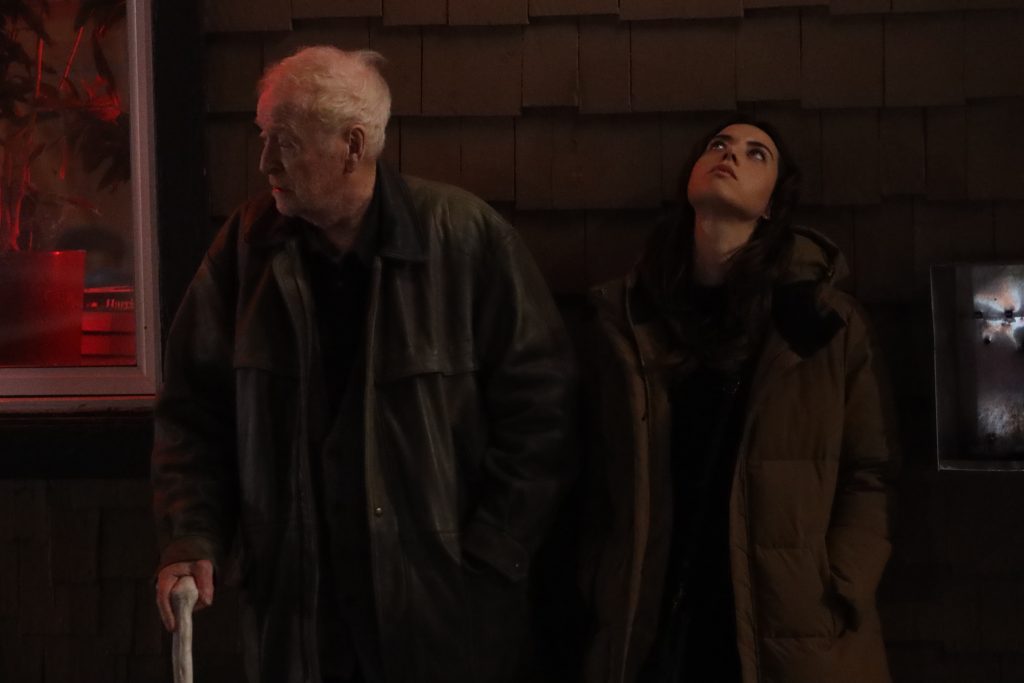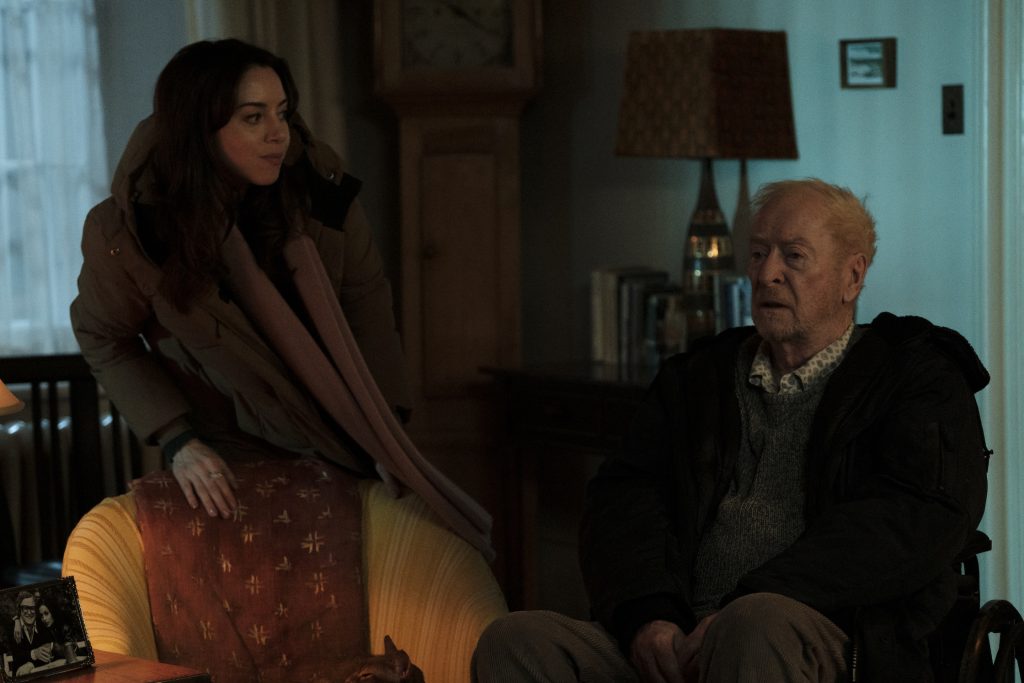June 4, 2022
by Carla Hay

Directed by David Cronenberg
Culture Representation: Taking place in an unnamed city, the horror film “Crimes of the Future” has a predominantly white cast (with a few black people and Asians) representing the working-class and middle-class.
Culture Clash: Two performance artist collaborators, who multilate bodies and perform organ surgeries as part of their act, encounter people who have their own bizarre agendies on how to change this act.
Culture Audience: “Crimes of the Future” will appeal primarily to people who are fans of filmmaker David Cronenberg and squeamish-inducing movies that don’t offer easy answers.

“Crimes of the Future” is not a crime drama but a body horror movie that has something unique to say about a society that becomes numb to mutilations. The movie’s striking visuals and enigmatic story can intrigue viewers who are ready for a slow-paced cinematic challenge. “Crimes of the Future” is definitely not writer/director David Cronenberg’s best movie, and it’s sure to be divisive, depending on people’s expectations before seeing this film.
“Crime of the Future” takes place in an unnamed part of the world where most people speak English with an American or Canadian accent, but there are plenty of people with accents from other places outside of North America. (The movie was actually filmed in Athens, Greece. “Crimes of the Future” had its world premiere at the 2022 Cannes Film Festival in Cannes, France.) Wherever the story takes place, it’s in an unnamed era when certain people’s bodies have evolved to be immune to pain, and they have the ability to grow organs that are outside the “norm.”
As such, it’s become a form of entertainment for live, invasive surgeries to be performed on these people. If a new organ is discovered during this type of surgery, it’s extracted and treated almost like a rare jewel or a prized trophy. These organs are then put on display. At the same time, a secretive National Organ Registry exists to find and register these taboo organs, which are often tattooed for identification purposes. The National Organ Registry keeps records of as many tattooed organs as it can find.
One of the people who has this ability to grow new organs is Saul Tenser (played by Viggo Mortensen), a solemn and pensive type who walks around wearing a black hooded cloak when he’s in public. If Saul had a scythe, he would look like he’s in a Grim Reaper costume. At home, Saul spends a lot of time in an OrchidBed, a half-cocoon-like device with tentacles, where he is routinely examined for possible new organs growing inside of him. Saul also uses a chair called the Breakfaster, which has arm rests that resemble and move like human arms.
Saul lives with his work partner Caprice (played by Léa Seydoux), a former surgeon who left the medical profession behind to become a full-time performance artist. Caprice is someone who does livestreamed surgeries as part of her performance act with a willing Saul. They both think that what they are doing is high art, but Caprice is much more fanatical about it than Saul is, and she’s the one who often does internal body examinations of Saul. Caprice and Saul’s act is called “Body Is Reality.”
Meanwhile, the beginning of “Crimes of the Future” shows the murder of an 8-year-old boy named Brecken Dotrice (played by Sozos Sotiris), who was smothered to death with a pillow by his mother Djuna (played by Lihi Kornowski) while Brecken was sleeping in his bed. Before he was killed, his mother observed Brecken eating a plastic garbage can in the bathroom, in a way that suggested that she’s seen him do this before. After Djuna killed Brecken, she called someone to come pick up the body.
“It will be here, but I won’t be,” Djuna said matter-of-factly to the person she was talking to on the phone. But when she hung up the phone, she started crying. The scene then shows that the man who arrives at the house to retrieve the body is Lang Dotrice (played by Scott Speedman), Brecken’s father. When Lang sees Brecken’s body, he also starts to sob. What is going on here? It’s explained later in the movie, which also shows what happened to Djuna and Lang.
The harvesting of organs has become a lucrative business. Some people see it as art, while others see it as a crime. But what concerns law enforcement the most in this story is that people with the ability to grow organs abnormally can pass down this ability genetically, thereby possibly creating a population of mutants. It’s the movie’s way of commenting on how eugenics play a role in this society.
During the course of the story, three people are heavily involved in finding and investigating people who have these “mutant” genetics. The National Organ Registry is operated by a stern agent named Wippet (played by Don McKellar), who calls “desktop surgery in public” a “fad” and “repulsive.” Wippet has a subordinate colleague named Timlin (played by Kristen Stewart), who is scientifically curious and less judgmental about these surgeries. And there’s a law enforcement officer named Detective Cope (played by Welket Bungué), who’s on the lookout for people with mutant genes. All three of these people encounter Saul and Caprice at various times during the movie.
Detective Cope works for a department called New Vice. He jokes to Saul that the department got that name because it sounded “sexier than Evolutionary Derangement.” Detective Cope adds, “Sexier gets more funding.” The detective also has a personal reason to hunt for mutants, because he believes that one of his colleagues was deliberately killed by a mutant. It has to do with a plastic candy bar that looked like real chocolate and was ingested by this cop, who died from eating this fake candy bar.
The live surgeries attract elite crowds that have the money to see this type of “high art.” The movie is a not-so-subtle commentary on how morality boundaries can change in a society that reaches a point where something such as paying to see live surgeries is acceptable, as long as it makes a lot of money. At the same time, anything that makes a lot of money is open to getting scrutiny from those who want to regulate and control it.
“Crimes of the Future” also shows how anything that makes a lot of money is often deemed sexy and desirable. More than once, people make a comment that says that this type of surgery is “the new sex.” There are multiple scenes that show how open surgery wounds or surgery scars are considered erotic.
One of the movie’s more visually memorable images is of a man—who has ears that look like skin growths all over his body—getting his eyes and mouth sewn shut before he does a provocative dance for an audience. And there’s a subplot in “Crimes of the Future” about the concept of internal organs being “inner beauty,” with Saul being encouraged to enter an “inner beauty contest.” If all of this sounds too weird to watch in a movie, then “Crimes of the Future” is not for you.
Many scenes in “Crimes of the Future” are meant to make viewers uncomfortable. The live surgery scenes are not for viewers who get easily squeamish. On the other hand, the movie is not as gruesome as many other “blood and guts” horror films. What might make people more uncomfortable than the sight of seeing someone’s intestines being poked, prodded and extracted is the fact that the society in this movie is so casual about these procedures being so public.
“Crimes of the Future” is by no means a perfect movie. The story gets somewhat repetitive in making its point about how art, commerce and morality can get twisted into something unfathomable by the standards of today’s society. It can be labeled science fiction, but it’s not too far off from reality, when in this day and age in real life, there are plastic surgeons who make money from doing livestreams of their surgeries, with the participating patients’ permission to do these livestreams.
Some of the acting and dialogue in “Crimes of the Future” can be stiff and dull. In fact, one of the movie’s biggest flaws is that the characters could have used more depth to their personalities. Mortensen’s Saul is the only one of the main characters who’s written and performed as someone who has more on his mind than these surgeries and mutant genetics. Stewart, who whispers a lot of her dialogue in a way that will thoroughly annoy some viewers, portrays Timlin as fidgety and often insecure—in other words, someone who’s a lot like other characters that Stewart has played before in movies.
The movie introduces a few subplots that ultimately go nowhere, including a possible love triangle between Saul, Caprice and Timlin. Caprice tells Saul almost from the moment that they meet Timlin that she doesn’t trust Timlin. Caprice has a reason to be suspicious, because as soon as Timlin finds out that Saul and Caprice are not lovers, Timlin lets Saul know that she’s romantically interested in him. It’s never really made clear if Caprice is secretly in love with Saul or not, but Caprice acts very possessive of Saul throughout the movie.
Another useless subplot is the introduction of two technical experts named Berst (played by Tanaya Beatty) and Router (played by Nadia Litz), who don’t add much to the story. Berst and Router do repairs on the devices that Saul uses, such as the OrchidBed and the Breakfaster. The last time Berst and Router are seen in the movie, they’ve climbed naked together into an OrchidBed because they want Caprice to do some kind of surgery on them.
“Crimes of the Future” is a very “male gaze” movie, because Caprice is in another scene where she’s shown fully naked too. It’s a scene implying that Caprice is getting sexually aroused by a surgical procedure. Meanwhile, there is no full-frontal male nudity is this movie at all. Caprice could have been a more fascinating character, but she’s very underwritten. She’s coldly clinical for most of the movie, except for scenes that have a sexual context.
Lang ends up seeking out Saul and Caprice for a reason that’s revealed in the last third of the film. This reason is sure to turn off many viewers of the movie, but it’s an extreme example of how far people in this “Crimes of the Future” world will go to get attention for these live surgeries. The messages and themes in “Crimes of the Future” are sometimes delivered in a disjointed and muddled way, but the movie serves up some uncomfortable truths about how human nature can be fickle and how ethical standards of society can fluctuate.
Neon released “Crimes of the Future” in U.S. cinemas on June 3, 2022.


